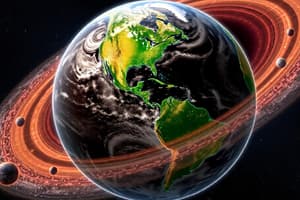Podcast
Questions and Answers
The solar system is composed of the sun and the eight major ______ revolving around it.
The solar system is composed of the sun and the eight major ______ revolving around it.
planets
Among those eight planets, only one can support life which is ______.
Among those eight planets, only one can support life which is ______.
Earth
A planet must be located in the ______ Zone to support liquid water.
A planet must be located in the ______ Zone to support liquid water.
Goldilocks
Mercury experiences extreme temperatures due to its slow ______.
Mercury experiences extreme temperatures due to its slow ______.
Venus has a very thick atmosphere that contributes to an increased ______ effect.
Venus has a very thick atmosphere that contributes to an increased ______ effect.
Mars has very little volcanic activity compared to ______.
Mars has very little volcanic activity compared to ______.
The solar energy received by Mercury and Venus is too much, contributing to their ______ temperatures.
The solar energy received by Mercury and Venus is too much, contributing to their ______ temperatures.
The capability of early Earth to sustain ______ dramatically increased the possibility of life.
The capability of early Earth to sustain ______ dramatically increased the possibility of life.
Flashcards are hidden until you start studying
Study Notes
Composition of the Solar System
- The solar system consists of the sun and eight major planets.
- Earth is the only planet that can support life among these eight.
Conditions for Habitability
- Two key requirements for a planet to support life:
- The star must survive long enough for life to develop, necessitating a medium-mass star like the sun.
- The planet must be located in the Goldilocks Zone, where conditions allow for liquid water.
The Goldilocks Zone
- The Goldilocks Zone allows Earth to maintain a temperature that is neither too hot nor too cold.
- Earth's distance from the sun results in a suitable amount of solar energy, crucial for sustaining liquid water.
Impact of Temperature on Life
- Water is essential for life; it evaporates at high temperatures and freezes at low temperatures.
- Early Earth's capability to support liquid water greatly increased the potential for life.
Conditions on Other Inner Planets
- Mercury is too close to the sun, leading to extreme temperatures and a very thin atmosphere, preventing heat retention.
- Venus, also close to the sun, has numerous active volcanoes contributing to a thick atmosphere that causes a severe greenhouse effect, resulting in high surface temperatures.
Conditions on Outer Planets
- Mars has minimal volcanic activity, leading to a thin atmosphere and cold surface temperatures, which limits its habitability.
- The gas giants (Jupiter, Saturn, Uranus, Neptune) are primarily composed of gases with no solid land, making them inhospitable for life.
Conclusion
- Earth's unique combination of distance from the sun, presence of liquid water, and atmospheric conditions differentiates it as the only planet in the solar system capable of supporting life.
Studying That Suits You
Use AI to generate personalized quizzes and flashcards to suit your learning preferences.




